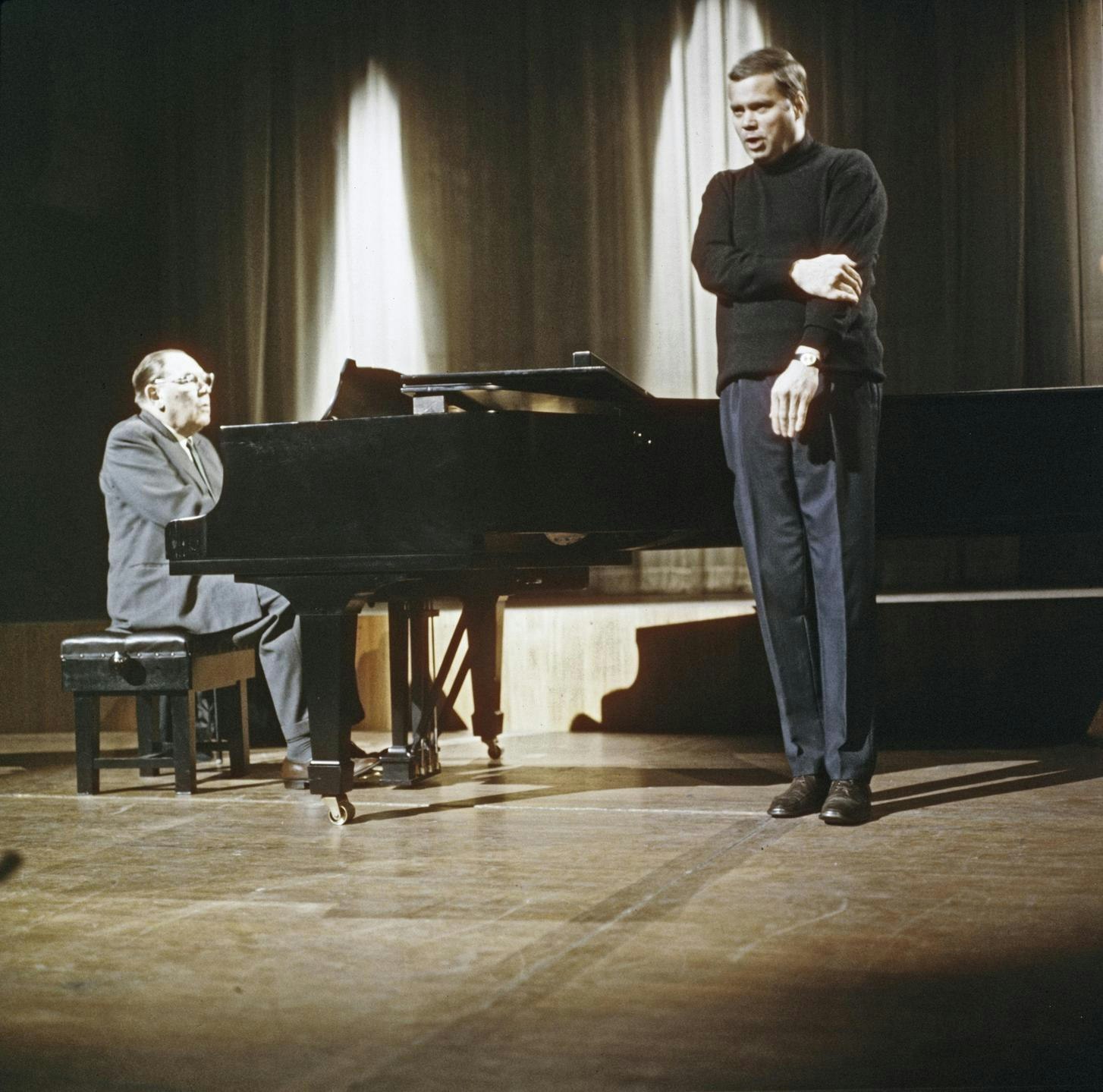This article is taken from the July 2025 issue of The Critic. To get the full magazine why not subscribe? Right now we’re offering five issues for just £25.
One morning in 2007 I knocked at the door of a Berlin villa and was admitted by staff. I was shown into a music room whose colour was a dark brown. Dietrich Fischer-Dieskau was in matching mood. The great Lieder singer had entered a sombre senescence. In our conversation he looked back with regret, not satisfaction. “I achieved too much,” he grumbled. “I left too little for my successors.”
In retrospect, he might have been right. A hundred years since his birth, his art form has faded to the edge of awareness. Classic FM bans Lieder from its broadcasts. No new art-songs are being written by any noted composer. You’d never see a young person take a first date to a Lieder recital unless they’re self-declaring as nerds. The German Lied is uncool.
An 80-CD box of Fischer-Dieskau’s life’s work has been issued by Warner and very welcome, too. It is but a fragment of his legacy. Go online, and you’ll find a thousand LPs with his face on the cover. Too much, he muttered. Still, without him, there might be no Lieder out there at all.
A lifelong Berliner, Fischer-Dieskau did not think of himself as a solo artist until one day, as a prisoner-of-war of the Americans in Italy, he opened his mouth, and all work stopped. Stick-thin, he hitched lifts to Berlin and convinced Elsa Schiller, music chief on the US radio station, to audition him. “Can you sing Winterreise?” demanded Schiller. After two songs, she sacked his pianist and sat with him, this shy, 22-year-old baritone, until one in the morning, polishing his Schubert. That was 1948, his recording debut.
Schiller introduced him to her brilliant Hungarian conductor Ferenc Fricsay who, in turn, gave him roles at the opera, culminating in a stentorian Don Giovanni. Munich beckoned with the best ensemble of the Sixties — Wolfgang Windgassen, Christel Goltz, Leonie Rysanek, Brigitte Fassbaender, Lucia Popp. I asked if he ever joined them after curtain for a drink or dinner. “No,” he said without hesitation.
“Why not?”
“What would I have said to them?” he shrugged.
A serious thinker in a changing room of thespians, he applied his mind to Schubert and Brahms. This was his mission, his passion. The German language, tainted by Nazism, was unwanted abroad.
EMI paired Fischer-Dieskau with a phlegmatic, older pianist, Gerald Moore. The English accompanist asserted equal rights for his role; his German partner became sensitive to instrumental nuance. They played pranks on each other. Together, they brought the German Lied back to life in London, New York and Tel Aviv.

Tragedy struck in 1963 when Fischer-Dieskau’s first wife, the cellist Ingrid Poppen, died after giving birth to their third son. Six weeks later, Fischer-Dieskau was back on the road. “Did you not think of taking more time to spend with your boys?” I wondered.
“No,” he insisted. “I had my work.” When his sons grew up, he urged them to change their surname, to escape his towering shadow. None of them obliged. He regretted that, too.
He was not without humour, but it was a caustic Berlin mirth, coarsened by experience. He never forgave the Nazis for taking his epileptic older brother Martin to a state institution, where he was starved to death. He never spoke about it, either.
His privacy was impermeable. After two failed remarriages, a fourth attempt with the Hungarian soprano Julia Varady brought belated comfort.
What he knew about life was distilled into Lieder. His Schubert cycles on record evolve without high drama but with a slow-revealed wisdom. With Schumann he walks suicidally close to the banks of the roaring Rhine. His Brahms is elemental, rippling with German glottal stops.
Some critics found his performance “effortless”. Little did they know. Every Lied was refined in his room to a point of perfection that could surely never be bettered, until the next time he sang it.
Strauss, Pfitzner, Henze, Berg, even Schoenberg, he delivered them all, contextualising inter-war atonalities as a positive counterweight to the lush sentimentalities of late romanticism. I find particular empathy in his embrace of the exile songs of Hanns Eisler, a Berliner in Hollywood, his mother-tongue ripped away by monsters.
Fischer-Dieskau befriended the gay Berlin composer Aribert Reimann, who composed Lieder by the Holocaust poet Paul Celan, followed by a King Lear opera. So much he learned and still not enough. In his late sixties, he learned Russian to encompass the pitch-black Michelangelo songs of Dmitri Shostakovich.
His was not a strikingly beautiful voice. Where others shone and dazzled, he persuaded and purred with a velvety caress. He could jar the ear in declamatory passages. Late on, he strained at the top. But his diction in five languages was immaculate, and his authority was insurmountable. Other singers presented Lieder recitals. Fischer-Dieskau personified the art form.
He named Matthias Goerne and Thomas Quasthoff as worthy successors, but he lamented the decline of Lieder, especially from neglect by voice teachers and feared that two centuries of German civilisation might end with him. He died in May 2012. We shall not see his like again.
But at Wigmore Hall and other refined spaces, I sense a revival. Star pianists are nuzzling up to Lied singers for intellectual stimulation. Daniil Trifonov now tours with Goerne, as does the Chopin winner, Seong-Jin Cho. Benjamin Appl, Fischer-Dieskau’s last pupil, seeks transmission from the nonagenrian György Kurtág.
Mitsuko Uchida now partners Magdalena Kozená in French chanson and Dorothea Röschmann in ever-giving Lieder. Across musical fences there is a budding of Lieder collaboration. It’s a healthy transaction. It might even soon be cool.












